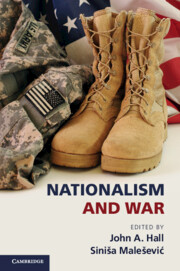Book contents
- Frontmatter
- Contents
- List of figures
- List of tables
- Notes on contributors
- Introduction
- Part 1 Fighting for the nation?
- Part 2 The varieties of nationalist experience
- Part 3 Empires and nation-states
- 6 Empire and ethnicity
- 7 The role of nationalism in the two world wars
- 8 Empire, ethnicity and power
- 9 Is nationalism the cause or consequence of the end of empire?
- 10 Obliterating heterogeneity through peace
- Part 4 Empty shells, changed conditions
- Index
- References
8 - Empire, ethnicity and power
A comment
Published online by Cambridge University Press: 05 April 2013
- Frontmatter
- Contents
- List of figures
- List of tables
- Notes on contributors
- Introduction
- Part 1 Fighting for the nation?
- Part 2 The varieties of nationalist experience
- Part 3 Empires and nation-states
- 6 Empire and ethnicity
- 7 The role of nationalism in the two world wars
- 8 Empire, ethnicity and power
- 9 Is nationalism the cause or consequence of the end of empire?
- 10 Obliterating heterogeneity through peace
- Part 4 Empty shells, changed conditions
- Index
- References
Summary
This comment is partly rooted in reflections on two chapters written by John Darwin and Michael Mann for this collection. It uses their chapters as a springboard for thoughts about empire, ethnicity, and power in the modern age. John Darwin's paper is about ethnicity and empire. It argues that although ethnic consciousness is usually taken to be the enemy of empire it can actually be the opposite. He roots his argument in a discussion of British imperial ethnicity in the late nineteenth and twentieth centuries. Michael Mann's chapter looks at the role of nationalism in the causes and the outcomes of the two world wars of the twentieth century. He argues that nationalism's impact was less than is often assumed.
The two chapters by Darwin and Mann cover different but overlapping themes. What unites them is a concern for the impact of geopolitics and political identity on the twentieth-century competition between the great imperial powers. This is a vast and complex theme but some of its core elements are relatively simple. For a polity to survive it needs to meet the requirements of the era in which it lives and the society over which it rules. By 1900, the nation in one form or another seemed best able to meet the domestic requirements of most modern European societies. But in the world of international relations the future seemed to belong to empires of continental scale and resources. Much of twentieth-century history therefore witnessed efforts to square the circle by creating imperial nations and national empires. Though societies and the nature of global power have to some extent evolved over recent decades, many of the realities that underpinned these efforts to merge empire and nation are still very relevant.
- Type
- Chapter
- Information
- Nationalism and War , pp. 197 - 211Publisher: Cambridge University PressPrint publication year: 2013

